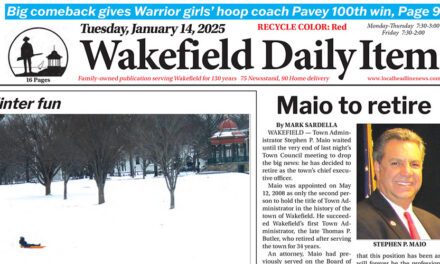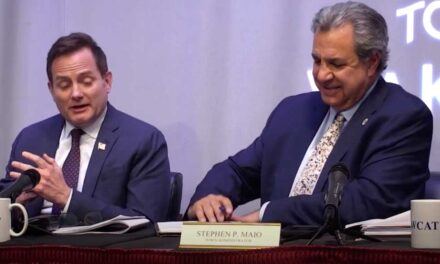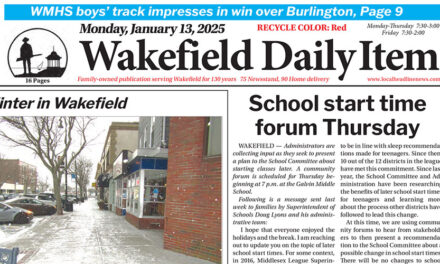Published in the April 10, 2018 edition.
By MARK SARDELLA
WAKEFIELD – Two matters at last night’s Board of Selectmen’s meeting sparked heated debate among members over the board’s role in advocating for current issues.
One of the issues was local, namely the changing of the board’s official name from selectmen to Town Council.
The other issue related to the national gun control debate.
On last night’s agenda was a proposal to send a letter from the Board of Selectmen to be published in this newspaper related to a question that will appear on the April 24 Town Election ballot. The proposed letter urges citizens to vote in favor of changing the name of the Board of Selectmen to Town Council.
The letter as written presents arguments in favor of changing to the gender neutral name, noting that no other board or committee in town has a “gender specific name.” The letter argues that the change “not only benefits women but also signals that Wakefield is a welcoming community open to all” and would send “a clear message that the senior board in town is not ‘for men only.’”
The letter points to job titles, such as “police officer” and “firefighter” that are now gender neutral.
“It’s time to change the name of the Board of Selectmen to Town Council,” the letter asserts. “We urge everyone to vote Yes on the April 24 ballot question.”
Selectman Brian Falvey made a motion to submit the letter, saying that it would send a “signal that we care not just about quality of life but equality of life.” He also said that he saw his role on the board as a proactive rather than a reactive one.
But Selectman Ed Dombroski said that he didn’t think it was appropriate for the board in its official capacity to be sending out advocacy letters for any position. He argued that the board had fulfilled its role in placing the matter before the voters, first at Town Meeting last November and now at the upcoming Town Election. He said that he was not aware of the board engaging in similar advocacy in the past.
Selectman Ann Santos said that she thought that the board may have taken a position on the downtown parking garage.
“I think that advocating for the name change is absolutely good for this town,” she said, adding that if Dombroski did not wish to sign the letter his name could be removed.
Dombroski countered that it had nothing to do with the issue at hand but rather with the process. He said that any individual member of the board was entitled to write a letter. He said that there were many in town who agreed with the name change, but there were also many who did not.
“If we’re looking to be inclusive, we need to be respectful of every opinion,” he said. “We’ve done our job. We put it before the voters. I have a comfort level with the voters’ decision.”
Board member Tony Longo said that he supported sending the letter, adding that as the governing body of the town, it was important for the board to show a united front to the voters.
Selectman Peter May, who chaired the meeting in the absence of Chairman Paul DiNocco, said that he agreed with Dombroski that it might be better if individual members sent letters.
Dombroski wondered if it was proper for the board to send such a letter without a unanimous vote. He further noted that the board chairman was not even present to weigh in.
Selectman Mehreen Butt disagreed.
“Our power as a board and our unity as a board is we’re going to take positions on things,” she said. She added that there were state and national issues coming up that she would be expecting the board to take positions on, including the transgender rights question on the 2018 state ballot.
Ultimately, to reflect the lack of unanimity, the board changed the wording of the letter slightly so that it began with, “We the undersigned members of the Board of Selectmen,” rather than “As members of the Board of Selectmen.”
The vote was 4-2 to send the amended letter out, with Santos, Butt, Falvey and Longo in favor. Dombroski and May opposed sending the letter.
The second issue involved a proposed resolution “urging the President of the United States, the United States Senate and the United States House of Representatives to act on gun control legislation.”
The resolution asserted that, “Federal elected officials have continually been unwilling or unable to pass reasonable gun legislation, despite multiple mass shootings, killing school children and other innocent individuals with assault weapons.”
The resolution referenced a mass shooting in 2000 in Wakefield where seven individuals were shot and killed in a workplace by a coworker.
On behalf of the Board of Selectmen, the resolution calls upon federal lawmakers to “re-institute the ban of the sale of assault weapons, pass legislation banning the possession and/or use of so-called bump-stock devises, re-institute reasonable restrictions on who may seek to purchase or otherwise obtain firearms, as well as re-institute reasonable background checks on all individuals seeking to purchase firearms, otherwise obtain firearms or to license firearms.”
The resolution is signed “Wakefield Board of Selectmen.”
Town administrator Stephen P. Maio said that he was asked to draft the resolution. He noted that it was similar to one from another community. (The Melrose Board of Aldermen passed a very similar measure recently, although the vote was not unanimous.)
The discussion split along similar lines as the previous one.
May pointed out that there was no language addressing the role of mental illness in mass shootings and asked for such language to be added. He also noted that background checks are already required to purchase a firearm.
Dombroski said that resolutions usually come when there is near universal support for a cause. He maintained that the language of the resolution put forth specific measures as the answers to gun violence. He questioned whether everyone agreed with those answers.
Falvey said that he was “proud to take a stand on a national issue.” He said that the point of the resolution was to appeal to national leaders to solve the issue.
But Dombroski insisted that the board represents all of Wakefield, and there was not unanimity on this issue.
“If we are going to be inclusive, we should not disenfranchise people,” he said. He also said that he did not feel that it was appropriate for the board to advocate via the resolution because it was written with a decided political slant.
Santos suggested that Dombroski was “nickel and diming” the issue.
Butt maintained that the resolution was in support of the students who walked out of school to call for action on gun violence. “This is a resolution saying we as a town support you doing something,” she said. “This is a message about how we are as a town.”
After further discussion, the board inserted a phrase related to mental health, but Dombroski thought that addressing mental health only as it relates to guns was inadequate. He suggested that mental health was the larger issue and the gun piece should flow from that, rather than the other way around.
In the end, the board’s vote to issue the resolution was unanimous.




